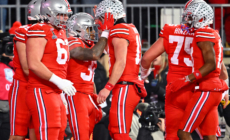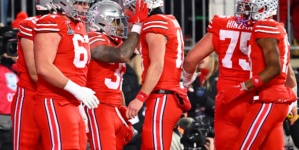-
‘Nutcracker’ Is a Casualty of a ‘Quarantine’ of Russian Culture in Lithuania - 11 mins ago
-
‘Connections’ December 22: Hints and Answers for Game #560 - 25 mins ago
-
‘The Interview’: Jonathan Roumie - 55 mins ago
-
College Football Playoff: Ohio State Routs Tennessee, Will Face Oregon in Rose Bowl - about 1 hour ago
-
Alpha Prime Racing Confirms Huge Crew Chief Signing For NASCAR Xfinity Series - 2 hours ago
-
Religion Has Been in Decline. This Christmas Seems Different. - 2 hours ago
-
Chandler Smith Secures Full-Time NASCAR Drive After Joe Gibbs Racing Exit - 2 hours ago
-
University of California Resolves Civil Rights Complaints Over Gaza Protests - 2 hours ago
-
Giants Predicted To Steal Mets’ Pete Alonso In Free Agency - 3 hours ago
-
Police Fatally Shoot Man Who Drove Pickup Into Killeen Mall, Injuring 5 - 3 hours ago
L.A. mayor selects longtime lawman Jim McDonnell as city’s next police chief
Los Angeles Mayor Karen Bass selected Jim McDonnell to serve as the city’s next police chief Friday, ending a months-long search process and ushering in a new era for one of the country’s largest police departments.
In picking the longtime lawman — who helped implement a federal consent decree as an LAPD assistant chief and later was elected Los Angeles County sheriff — Bass is getting a steady hand as the massive security challenges of the World Cup and the Olympic Games loom on the horizon.
However, the appointment of McDonnell, who is white, came as a surprise — and a disappointment to some — who hoped Bass would appoint the city’s first Latino or woman to serve as chief.
At a news conference Friday announcing her decision, Bass said she spoke with many of McDonnell’s former colleagues, who described him as honest and “a man of integrity.”
“These are essential leadership traits we will need to continue to transform the department while addressing the near and far challenges we will face in the coming years,” Bass said.
McDonnell was with the LAPD for 28 years, sometimes serving as the department’s public face while serving as an assistant chief under Chief William J. “Bill” Bratton. After an unsuccessful bid for a second term as sheriff, McDonnell took a job with USC. While he was widely viewed as a potential successor to former LAPD Chief Michel Moore, who stepped down earlier this year, McDonnell has kept a lower public profile than other candidates.
McDonnell, who heads the Safe Communities Institute at the USC Price School of Public Policy, was one of the three finalists chosen by the civilian Police Commission from a field of more than 25 applicants to lead one of the nation’s largest police departments.
McDonnell noted that he began his career at the LAPD academy 43 years ago, and said in a news release issued by the mayor’s office that his goals include growing the LAPD “back to full strength through recruitment and retention” and making changes to “ensure respectful and constitutional policing practices.”
“I love this city — and I understand the modern-day challenges our officers face in working to protect it,” McDonnell said in a statement. “It is a tremendous honor to lead the men and women of the LAPD. I will work hard to make sure their work to keep Angelenos safe is supported.”
McDonnell still requires confirmation by the City Council, where approval is widely expected. The other finalists also had strong LAPD ties: Deputy chief Emada Tingirides, who runs the department’s South Bureau, and Robert “Bobby” Arcos, who left the department in 2018 and took a high-ranking position in the L.A. County District Attorney’s office.
Bass had made clear she wants the next police chief to focus heavily on improving officer morale, while also removing obstacles to recruitment at the LAPD. Explaining her choice of McDonnell, the mayor cited the chief’s role in preparing for the 2028 Olympics and 2026 World Cup.
“After visiting France and seeing the games, the magnitude of what L.A. needs to prepare for is crystal clear to me, and I trust that Jim McDonnell will make sure that we are prepared and vigilant for anything that comes away this day,” Bass said.
A report released by Bass last month focused heavily on complaints from the rank-and-file about the department’s disciplinary process, its complaint system, high stress, “inadequate” staffing and the level of support provided after “critical incidents,” such as shootings by officers.
“We will use this information not just to find our next chief of police but also as guidance as we press forward with reforms that make Los Angeles safer while supporting our officers,” Bass said last month.
During his tenure with the LAPD, McDonnell made a mark by working with the city’s diverse communities and political leaders to restore confidence in the department after the Rampart corruption scandal of the late 1990s and early 2000s, where officers committed robberies and murders.
In 2002, during his first run for the chief’s job, McDonnell won praise for presenting a blueprint for a more grassroots style of policing that sought to strike a balance between crime-fighting and community relations; the strategy was later adopted by Bratton and served as the foundation for overhauling the organization.
The Los Angeles Police Protective League, which represents about 8,800 officers, voiced support for the mayor’s pick, saying it shows that Bass is committed to improving police staffing, boosting officer morale and fixing a “broken discipline process.”
“We have every confidence in Chief McDonnell’s ability to hit the ground running to improve public safety in Los Angeles and to appoint an upper command staff that will do away with the status quo and turn a new page for the LAPD,” said the union, in a statement from its board of directors.
As chief, McDonnell faces the difficult task of continuing some of his predecessor’s reforms around de-escalation and pretextual traffic stops while addressing more entrenched problems. The department is hundreds of officers below the number it had even two years ago, and recruitment efforts have so far failed to pay off.
Most violent crime categories are now even with or below their numbers at this time last year, after a surge of incidents to start the year. And yet a string of high-profile incidents, including most recently the alleged hijacking of a city bus that led to the slaying of one man, have made growing lawlessness a constant theme on nightly newscasts and on social media.
Police shootings have similarly leveled off, but the department continues to face criticism that it isn’t doing enough to curtail officer uses of force.
McDonnell said Friday he wants to “make the department a model for the nation,” and described himself as being fired up for the challenge after years away from leading a law enforcement agency.
“I see an opportunity now to emerge from that period and to be able to move forward, and I feel like I still have gas in the tank, fire in the belly, if you will, and a desire to be able to try and be helpful,” he said.
Colleagues within the LAPD have described McDonnell as a gracious, well-liked leader.
Former LAPD Chief Charlie Beck said McDonnell “brings a depth of experience and knowledge which is absolutely unmatched. His leadership will successfully guide and mold the future of law enforcement in Los Angeles and the nation.”
Former assistant chief Horace Frank praised “the moral and intellectual caliber” of McDonnell, saying, “This is a bold decision by the mayor and she deserves a lot of credit.”
Even though he’s been away from the department for more than a decade, McDonnell brings a “wide breadth of experience” to the job, according to Sandy Jo MacArthur, a retired LAPD assistant chief who like McDonnell went into academia after leaving law enforcement.
The fact that he has already led one of the largest law enforcement agencies, in the Sheriff’s Department, bodes well for his ability to step into his new position and be effective from Day 1, she said.
Now he is chief of the LAPD — a job he was passed over for twice.
The son of working-class immigrants from Ireland, McDonnell grew up in Boston before relocating to Southern California more than four decades ago.
He attended Don Bosco in Boston, where he considered drafting and architecture but realized he could not sit at a table for the rest of his life. So he headed off for St. Anselm College near Manchester, N.H.
During his senior year, he landed an internship with the Boston Police Department, and was hopeful of being hired after graduation. But then came a tax-cutting measure that cut the Boston police, so McDonnell moved out west.
He joined the LAPD in 1981 at the age of 21 and worked his way up the ranks, holding a variety of assignments in patrol, detective, vice, gang, organized crime, homicide and other divisions.
For McDonnell, it was a long-awaited vindication.
Twice before he applied for the LAPD chief’s job, losing out to Bratton in 2002 and Charlie Beck in 2009. He was appointed police chief of Long Beach in March 2010.
In 2014, he was elected Los Angeles County sheriff, following soon after Lee Baca, the longtime sheriff who retired under a cloud of scandals that included the federal indictment of sheriff’s officials for allegations ranging from assaulting jail inmates to hiding a jailhouse informant from the FBI. Under Baca’s watch, 18 employees were criminally charged and the department was found to have hired deputies with criminal histories, including Baca’s own nephew.
A year before winning the election, McDonnell publicly weighed a run, but ultimately did not enter the race because the task of fundraising for a countywide election would have taken him away from his family and his duties in Long Beach. He entered the race following the surprise retirement of embattled former sheriff Baca.
Some detractors argue that McDonnell was an effective leader but didn’t do enough to address the problems that surfaced during the Baca administration.
At Long Beach, McDonnell led a force that, while far smaller than the LAPD, faced the same concerns about staffing shortages. He has been criticized for a rise in officer-involved shootings, as well as the 2013 beating of an unarmed man.
He served one term as L.A. County sheriff before being replaced by Alex Villanueva in a stunning electoral upset for a seat that hadn’t seen an incumbent lose in more than a century. He later joined an exodus of high-ranking law enforcement officials moving into academia.
While with the university, a group of researchers began looking into the possibilities of using artificial intelligence to assess officer behavior and improve training.
At a USC forum last year about crime on the Metro system, McDonnell talked about the need for a multi-faceted crime response, which started with hiring more police officers and pushing for stronger penalties, while connecting those seeking help with services.
A Loyola Marymount University survey of Los Angeles residents showed stronger satisfaction with the LAPD’s overall performance than in recent years, even if swaths of the Black and Latino population see disparities in the way the department polices them.
Finding the city’s next police chief is one of the most closely watched decisions made by any mayor.
Nilza Serrano, who chairs the nonprofit Latino Equity and Diversity Initiative, said Friday she is “deeply disappointed” with Bass’ decision to pass over Arcos, someone she described as “highly qualified” to lead the LAPD.
Latinos have long been underrepresented in city management positions — and Bass had an opportunity to correct that imbalance, she said.
“This decision is a setback for both representation and progress in our city, and I don’t know what Latinos have to do to catch a break in this town,” she said.
Asked Friday about the concerns, Bass said she works “very deliberately and very assertively to make sure that there is representation everywhere.”
“I think there’s work that needs to be done in the LAPD,” she said. “I have spent the last few months visiting almost every station and meeting with officers. There’s a lot that needs to be done. I will continue to pay attention to representation, particularly with the Latino population, which we know is half of the city of Los Angeles.”
Bass has previously said she was surprised by the general feedback she received from rank-and-file officers, who unlike in other recent chief searches, seemed to openly favor an outside chief.
“I expected the officers to be pretty dug in to an inside, an internal candidate and that was not the case,” she said. “I would say the No. 1 concern from the officers’ perspective is their morale, and I thought that was going to be because of community perception around law enforcement — that is true, but what was more significant was low morale because of the internal workings of the LAPD.”
During the community forums, many attendees pushed for the selection of an insider who is attuned to policing in a city as vast and diverse as L.A. Bass said it was critical that the next chief address one of officers’ main gripes: the view that the department’s much-maligned disciplinary system has created a double standard for high-ranking officers.
Last month, Bass released a report detailing the results of a months-long survey about what civil rights groups, neighborhood council members, LAPD officers and others want in their next chief.
Miriam Krinsky, a former federal prosecutor and a former executive director of the county’s Citizens’ Commission on Jail Violence, described McDonnell as a “true public servant,” someone who has perspectives on law enforcement both as an insider and an outsider.
“He’s someone with an unwavering moral compass and tremendous integrity,” said Krinsky, who served as a special advisor to McDonnell during part of his time as Sheriff. “In my mind, every law enforcement agency, whether a police department or a Sheriff’s department, has to start with that.”
Councilmember Traci Park, who chairs the committee overseeing Olympic planning, said she was “thrilled” to welcome McDonnell as chief.
“He has the perfect combination of inside-outside experience, grassroots leadership, and community-based focus to seamlessly take the helm during a time of unprecedented crisis in our city,” said Park, who represents Venice and other neighborhoods on L.A.’s Westside. “I trust he will immediately begin restoring the ranks, improving morale, and addressing the crime epidemic plaguing Los Angeles.”
Source link





















